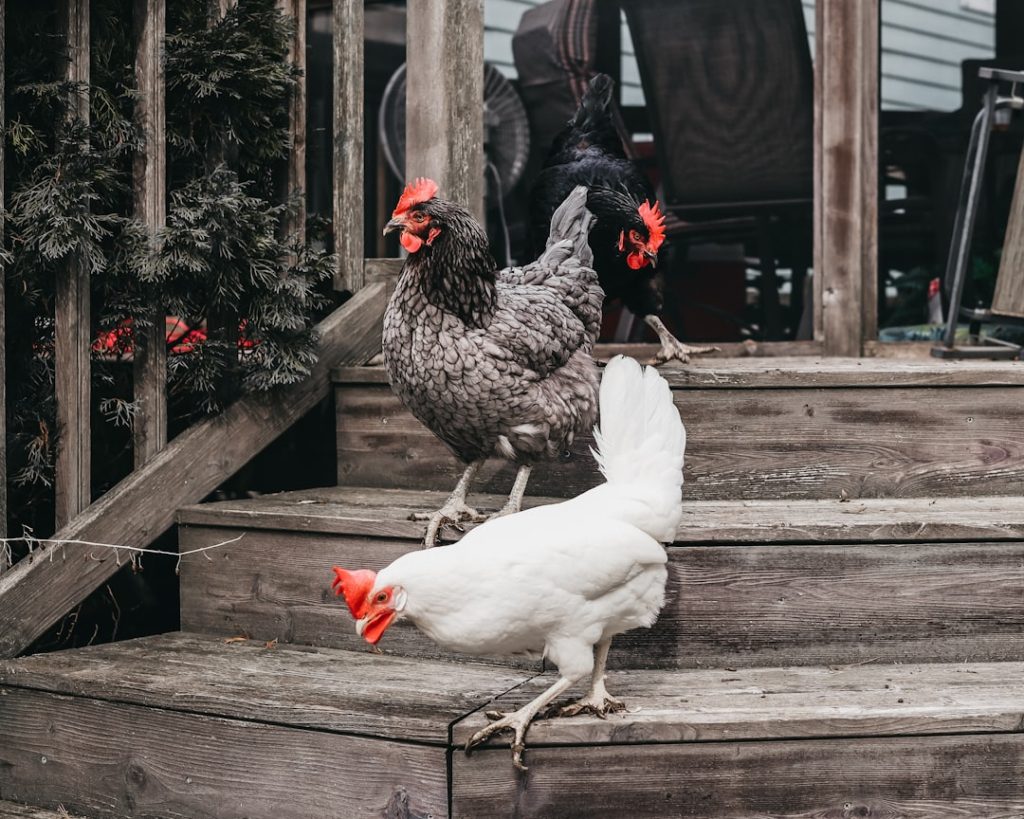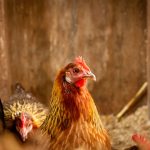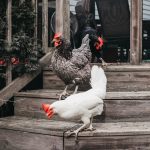Broiler chickens are a type of poultry specifically bred for meat production. These birds are typically ready for slaughter at 6-8 weeks of age, making them an efficient choice for commercial meat production due to their rapid growth rate. Proper care of broiler chickens involves several key factors to ensure their health and well-being.
Providing a clean and comfortable living environment is essential for broiler chickens. This includes constant access to fresh water and a nutritionally balanced diet. Housing should be well-ventilated and protect the birds from extreme temperatures and predators.
Regular health and behavior monitoring is crucial for early detection and resolution of potential issues. Broiler chickens require regular exposure to natural light to maintain their circadian rhythms and overall well-being. Adequate space for movement and natural behaviors, such as pecking and scratching, is also important.
Proper broiler chicken care fundamentally involves providing a clean and comfortable living space, a balanced diet, and consistent health and behavior monitoring.
Table of Contents
- 1 Setting Up the Ideal Broiler Chicken Environment
- 2 Feeding and Nutrition for Broiler Chickens
- 3 Health and Disease Management for Broiler Chickens
- 4 Managing Broiler Chicken Growth and Development
- 5 Slaughtering and Processing Broiler Chickens
- 6 Marketing and Selling Broiler Chickens
- 7 FAQs
- 7.1 What is a broiler chicken?
- 7.2 What are some key factors to consider when keeping broiler chickens?
- 7.3 What type of housing is suitable for broiler chickens?
- 7.4 What should be included in the diet of broiler chickens?
- 7.5 How can I ensure the health and welfare of broiler chickens?
- 7.6 What are some common challenges in keeping broiler chickens?
Key Takeaways
- Broiler chickens require proper housing, ventilation, and lighting for optimal growth and development.
- Providing a balanced diet with the right amount of protein, energy, vitamins, and minerals is crucial for broiler chicken nutrition.
- Regular health checks, vaccination, and proper hygiene practices are essential for preventing diseases in broiler chickens.
- Monitoring and managing the growth rate of broiler chickens is important to prevent health issues and ensure quality meat production.
- Understanding the slaughtering and processing techniques, as well as marketing strategies, is important for selling broiler chickens.
Setting Up the Ideal Broiler Chicken Environment
Space to Thrive
When it comes to housing, it is important to provide enough space for the birds to move around comfortably. Overcrowding can lead to stress, aggression, and an increased risk of disease, so it is essential to provide adequate space for the birds to thrive.
Ventilation for a Healthy Environment
In addition to space, ventilation is also a key factor in creating the ideal broiler chicken environment. Proper ventilation helps to maintain air quality, regulate temperature, and reduce the risk of respiratory issues. It is important to ensure that the housing structure allows for adequate airflow while also protecting the birds from drafts and extreme weather conditions.
Natural Light for Overall Well-being
Furthermore, providing broiler chickens with access to natural light is essential for their overall well-being. Natural light helps to regulate their circadian rhythms, promote healthy growth, and reduce stress. If natural light is not available, artificial lighting can be used to ensure that the birds receive enough light each day.
Creating the Ideal Environment
Overall, setting up the ideal broiler chicken environment involves providing enough space, proper ventilation, and access to natural light in order to ensure the health and well-being of the birds.
Feeding and Nutrition for Broiler Chickens
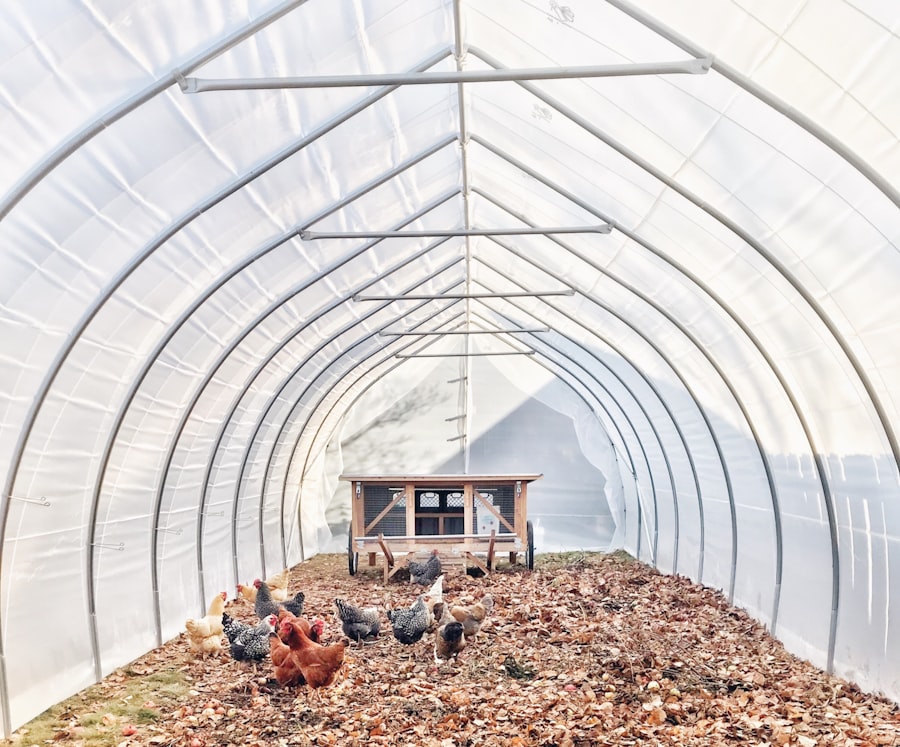
Feeding and nutrition play a crucial role in the growth and development of broiler chickens. A balanced diet is essential for ensuring that the birds receive the necessary nutrients to support their rapid growth and overall health. Broiler chickens require a diet that is high in protein in order to support muscle development and growth.
A typical broiler chicken diet consists of a combination of grains, such as corn and soybean meal, as well as essential vitamins and minerals. It is important to provide the birds with access to clean, fresh water at all times in order to support digestion and overall health. In addition to providing a balanced diet, it is important to monitor the birds’ feeding behavior and adjust their diet as needed.
Overfeeding can lead to obesity and health issues, while underfeeding can result in stunted growth and poor overall health. Regular monitoring of the birds’ weight and body condition can help to ensure that they are receiving the appropriate amount of food. Overall, feeding and nutrition for broiler chickens involves providing a balanced diet that is high in protein, monitoring feeding behavior, and ensuring access to clean, fresh water in order to support their rapid growth and overall health.
Health and Disease Management for Broiler Chickens
Health and disease management are critical aspects of broiler chicken care in order to ensure the overall well-being of the birds. Preventative measures, such as vaccination and biosecurity protocols, are essential in reducing the risk of disease outbreaks and maintaining a healthy flock. Regular monitoring of the birds’ health and behavior is also crucial in identifying any potential issues early on.
Common health issues in broiler chickens include respiratory infections, coccidiosis, and leg disorders. It is important to be vigilant in observing any signs of illness or distress in the birds in order to address any potential issues promptly. Furthermore, maintaining a clean and hygienic living environment is essential in preventing the spread of disease.
This includes regular cleaning and disinfection of housing structures, as well as proper waste management practices. Additionally, implementing biosecurity measures, such as limiting visitor access and quarantining new birds, can help to reduce the risk of introducing diseases into the flock. Overall, health and disease management for broiler chickens involves preventative measures, regular monitoring of the birds’ health and behavior, and maintaining a clean and hygienic living environment in order to ensure the overall well-being of the flock.
Managing Broiler Chicken Growth and Development
Managing the growth and development of broiler chickens is essential in ensuring that they reach their full potential for meat production. This involves providing a balanced diet that meets their nutritional needs, as well as monitoring their growth rate and overall health. In order to support rapid growth, broiler chickens require a diet that is high in protein and energy.
It is important to provide them with access to a balanced feed that meets their nutritional requirements at each stage of development. Additionally, monitoring their growth rate and body condition can help to ensure that they are receiving the appropriate amount of food. Furthermore, managing broiler chicken growth and development involves providing them with enough space to move around comfortably.
Overcrowding can lead to stress, aggression, and reduced growth rates, so it is essential to provide adequate space for the birds to thrive. Overall, managing broiler chicken growth and development involves providing a balanced diet that meets their nutritional needs, monitoring their growth rate and body condition, and ensuring that they have enough space to move around comfortably in order to reach their full potential for meat production.
Slaughtering and Processing Broiler Chickens
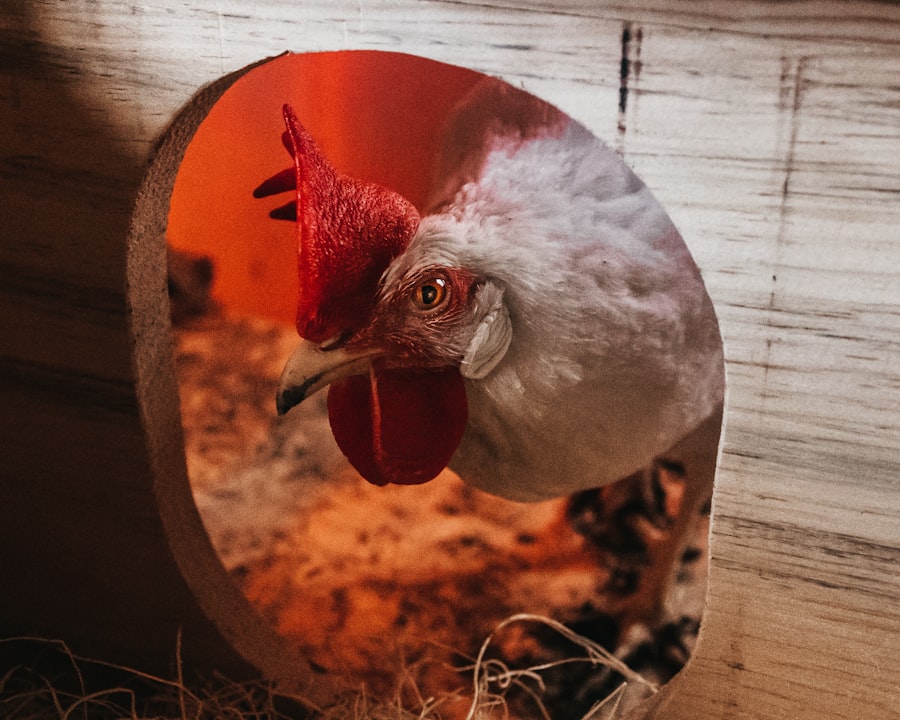
Humane Slaughtering Methods
When it comes to slaughtering broiler chickens, it is important to use humane methods that minimize stress and pain for the birds. This includes using sharp knives or mechanical stunning devices to ensure a quick and humane process. Additionally, proper training for workers involved in the slaughtering process is essential in order to ensure that birds are handled with care and respect.
Sanitation Practices for Food Safety
Processing broiler chickens involves careful sanitation practices in order to maintain food safety. This includes proper cleaning and disinfection of equipment and facilities, as well as adherence to strict hygiene protocols throughout the entire process.
Quality Control Measures
Implementing quality control measures can help to ensure that the meat meets safety standards before it reaches consumers. Overall, slaughtering and processing broiler chickens involves using humane methods for slaughtering, implementing sanitation practices for food safety, and adhering to strict quality control measures in order to maintain the quality and safety of the meat.
Marketing and Selling Broiler Chickens
Marketing and selling broiler chickens involves careful planning and consideration in order to reach consumers effectively. This includes identifying target markets, developing marketing strategies, and ensuring that the meat meets consumer expectations for quality and safety. When it comes to marketing broiler chickens, it is important to identify target markets based on consumer preferences and demand.
This may involve selling directly to consumers through farmers’ markets or establishing relationships with retailers or restaurants. Understanding consumer preferences for locally sourced or organic meat can help to tailor marketing strategies accordingly. Furthermore, developing effective marketing strategies involves creating a strong brand identity that communicates the quality and value of the meat.
This may involve highlighting factors such as humane treatment of the birds, sustainable farming practices, or superior taste and texture. Additionally, utilizing various marketing channels such as social media, advertising, or promotions can help to reach a wider audience of potential consumers. Overall, marketing and selling broiler chickens involves identifying target markets based on consumer preferences, developing effective marketing strategies that communicate the quality and value of the meat, and utilizing various marketing channels in order to reach consumers effectively.
If you’re interested in learning more about how to care for goslings, check out this informative article on how to care for goslings. It provides valuable information on raising and nurturing young geese, which can be a helpful resource for poultry enthusiasts looking to expand their knowledge beyond broiler chickens.
FAQs
What is a broiler chicken?
A broiler chicken is a type of chicken that is specifically bred and raised for meat production. These chickens are typically ready for slaughter at around 6-8 weeks of age.
What are some key factors to consider when keeping broiler chickens?
Some key factors to consider when keeping broiler chickens include providing proper housing, ensuring access to clean water and high-quality feed, managing temperature and ventilation, and implementing biosecurity measures to prevent disease.
What type of housing is suitable for broiler chickens?
Suitable housing for broiler chickens includes well-ventilated and spacious barns or coops that provide protection from predators and the elements. The housing should also allow for easy access to food and water.
What should be included in the diet of broiler chickens?
The diet of broiler chickens should consist of high-quality, nutritionally balanced feed that is specifically formulated for meat production. This feed should contain the necessary protein, vitamins, and minerals to support rapid growth and development.
How can I ensure the health and welfare of broiler chickens?
To ensure the health and welfare of broiler chickens, it is important to provide a clean and comfortable living environment, monitor for signs of illness, and promptly address any health issues. Additionally, following proper vaccination and biosecurity protocols can help prevent the spread of disease.
What are some common challenges in keeping broiler chickens?
Common challenges in keeping broiler chickens include managing rapid growth rates, preventing overcrowding, maintaining proper ventilation, and addressing potential health issues such as leg problems and heart conditions. It is important to stay informed and seek guidance from experienced poultry professionals to address these challenges effectively.
Meet Walter, the feathered-friend fanatic of Florida! Nestled in the sunshine state, Walter struts through life with his feathered companions, clucking his way to happiness. With a coop that’s fancier than a five-star hotel, he’s the Don Juan of the chicken world. When he’s not teaching his hens to do the cha-cha, you’ll find him in a heated debate with his prized rooster, Sir Clucks-a-Lot. Walter’s poultry passion is no yolk; he’s the sunny-side-up guy you never knew you needed in your flock of friends!

